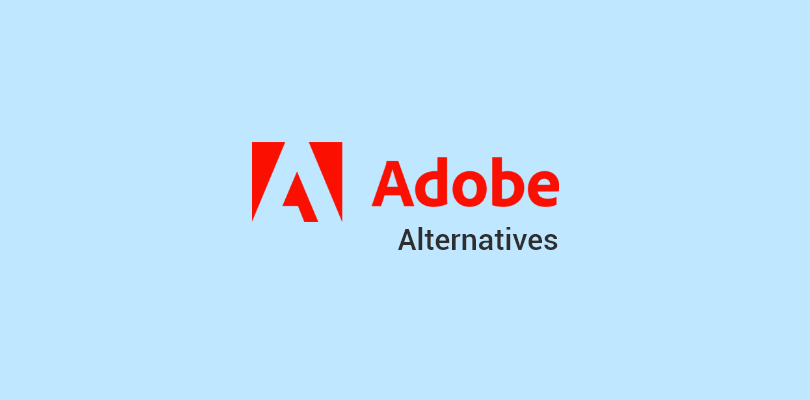Hiring and onboarding recruits is the second most important thing for your business’s success. The first one is retaining your best employees.
A 2025 study by LinkedIn’s “Workplace Learning Report” found that 7 out of 10 people acknowledge that learning improves their connection with their company.
Surprisingly, corporate learning management systems (LMS) are paramount in implementing workplace learning and training. The best LMS platforms facilitate onboarding, safety, compliance, and other training requirements.
In this blog, I’ve thoroughly compared the 11 best learning management systems and shared a detailed buying guide.
Before we get started, here’s your first glance at the tool names –
| Corporate Learning Management Systems | Best For | Pricing Starts From |
|---|---|---|
| ProProfs Training Maker | Easy Online Employee Training & LMS | Forever free for small teams. Paid plan starts at$1.99/learner/month |
| Docebo | Complex Enterprise Training | Custom Pricing |
| Absorb LMS | Complex Training Needs | Custom Pricing |
| Rippling | Automated Compliance & Training | Custom Pricing |
| iSpring Learn | eLearning & Training | $6.70/user/month |
| Seismic Learning | Training Sales Team | Custom Pricing |
| Paylocity | Employee Training & Development | Custom Pricing |
| Litmos | Off-the-Shelf Training | Custom Pricing |
| Tovuti | Corporate Learning & Development | Custom Pricing |
| 360Learning | Collaborative Learning | $8/user/month |
What Is a Corporate LMS?
A corporate LMS is a software platform that facilitates organizational training, learning, and professional development.
It is a centralized hub where your business can create, deliver, manage, and track employee training programs. These are mostly popular among enterprises that need a platform to train their employees on safety, compliance, onboarding, and more.
List of the 11 Best Corporate LMS Software
Finding the right software is never easy. Googling “corporate LMS systems” might lead you to discover some of the big names… but not any closer than that. I understand that is why you’re here.
In the last few months, I connected with industry leaders (product managers, HR managers, training managers, etc.) to understand which software tools they would choose and why.
This helped me narrow down my searches. Then, it was all about checking user feedback, testing the software, and preparing an exhaustive comparison with features, pros and cons.
Let’s get started.
1. ProProfs Training Maker
Best for Easy Online Employee Training & LMS
ProProfs Training Maker lives up to its name. You can create online training courses from scratch or use the pre-built templates and the AI course builder to jumpstart course creation.
There’s also a library of hundreds of expert-taught courses on topics like compliance and leadership. You can access these courses anytime, anywhere, and on any device. I also found that you can create groups, set group admins, assign roles and permissions, and set due dates and reminders, which are some essential features for corporate training.
But what sets the stage for the software is its free plan. As an AI-powered LMS, ProProfs lets you create unlimited online courses in just minutes using intelligent automation. These courses can be gamified with badges and leaderboards to enhance learner engagement.
The value becomes even more for large enterprises. You can white-label courses, create custom certificates, set learning paths, and generate AI-powered reports.
In my experience, it’s one of the best corporate LMS software for startups and large organizations. Plus, the pricing is scalable, which is great for growing businesses.
Features:
- Embeddable quizzes and surveys to assess knowledge retention
- Brain games to improve learner engagement and cognitive skills
- Shared folders simplify resource access for teams and group training
- Content uploads support videos, PDFs, and documents for enriched courses
- Compliance training courses like OSHA, HIPAA, sexual harassment prevention, etc., based on federal and state laws
Pros:
- Courses accessible on mobile devices for learning on the go
- Multi-language support – English, Spanish & 70+ other languages
- eCommerce options for selling courses, quizzes, and assessments online
Cons:
- No downloadable or on-premise version
- No dedicated account manager for the free plan, unlike paid
Pricing:
Forever Free plan available for small teams. Paid plan starts from $1.99/active learner/month. 15-day money-back guarantee. No hidden charges.
User Ratings:
Upgrade Your Corporate Training with an LMS
Streamline learning and development across your organization.
2. Absorb LMS
Best for Complex Training Needs
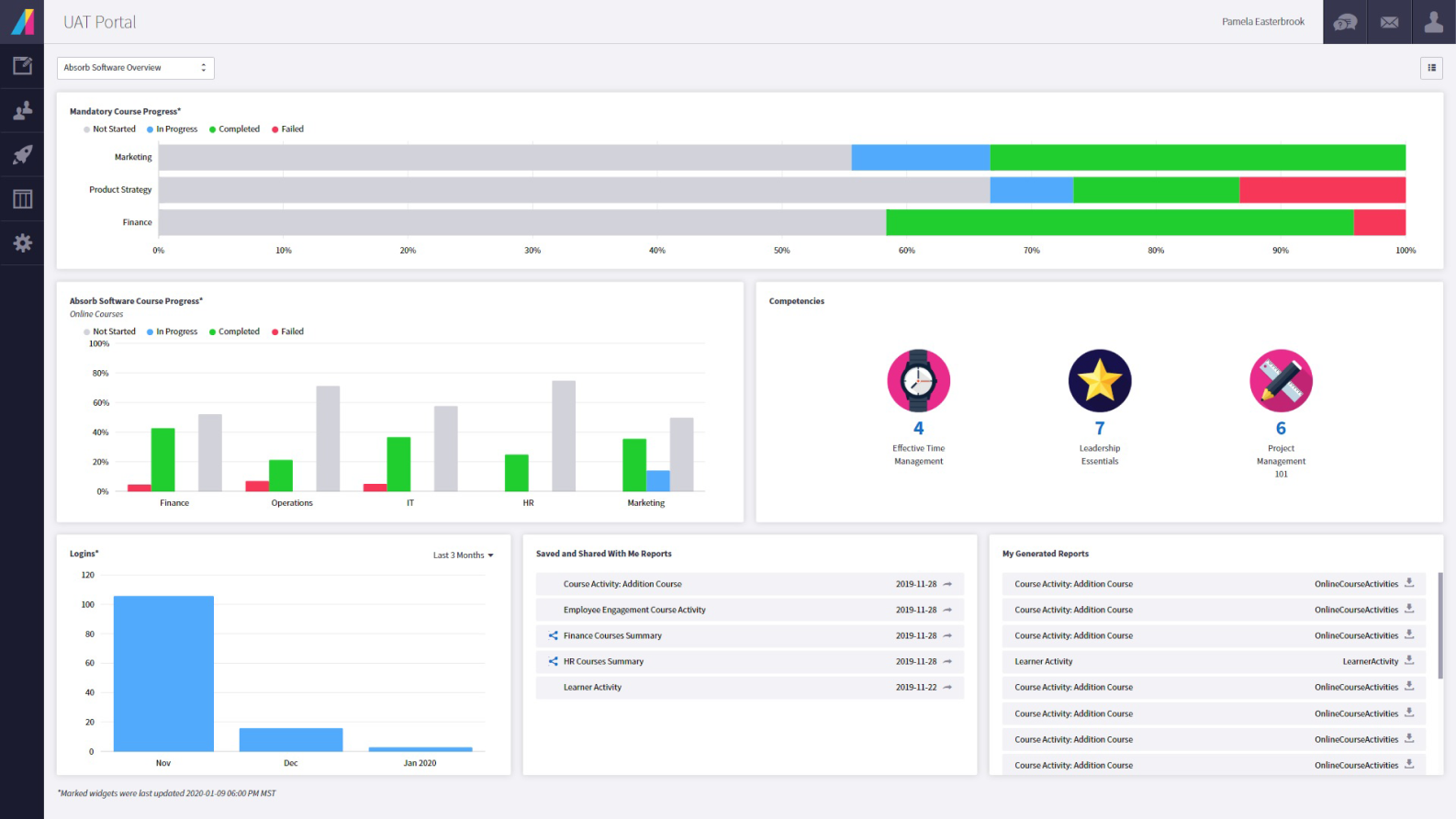
Absorb LMS offers a user-friendly interface combined with powerful features to address complex training requirements. It automates many administrative tasks, like enrollment and certification management. This frees up your time to focus on content creation and learner engagement.
You get features like gamification, social learning, and mobile accessibility, which can help keep employees motivated and invested in their training. The software can accommodate eLearning courses, videos, documents, and virtual classrooms.
Think about it: if your training is boring, people won’t pay attention, right? But with Absorb LMS, you can make learning more interactive for better knowledge retention.
Features:
- AI-powered recommendations suggest courses based on learner activity and behavior
- Observational checklists validate practical skills through structured on-the-job assessments
- SCORM compatibility for management of industry-standard training content
- Video search capabilities to help learners find specific content within training videos
- Customizable dashboards for detailed insights into training outcomes
Pros:
- Built-in eCommerce tools simplify course sales with discounts and tax options
- A dedicated mobile app supports training access anytime
- 24/7 in-house support ensures issues are resolved promptly
Cons:
- Some users have noted that the software offers limited assessment types
- Custom reports may require significant manual configuration, which can be time-intensive
Pricing:
Pricing depends on user count, features, integrations, and support. Fees include setup, training, and add-ons, and costs rise for advanced configurations.
User Ratings:
3. Docebo
Best for Complex Enterprise Training
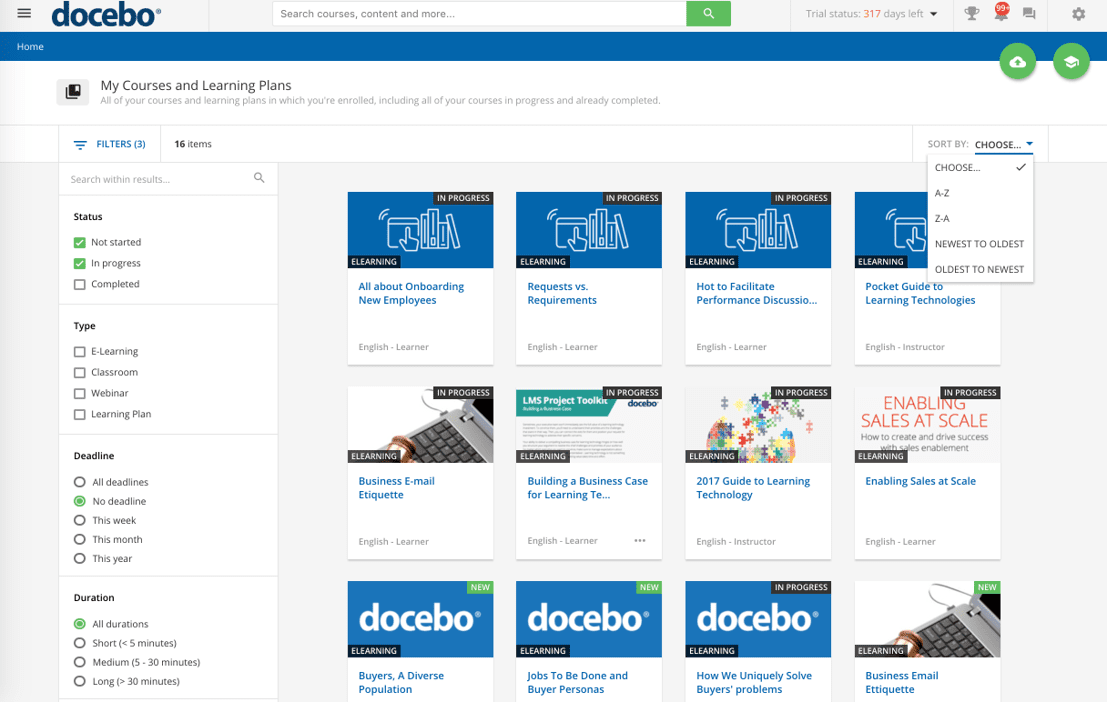
Docebo takes corporate training to a whole new level with its AI-driven learning capabilities. The platform offers tools like learning paths, skill tracking, and detailed analytics that help you manage large-scale training effectively.
The system supports various learning formats, including eLearning, instructor-led training, and blended learning. Its analytics provide real-time insights to measure training effectiveness. These insights help you improve employee performance through tailored content.
In my opinion, the platform works well for organizations managing training across teams or locations. If your business manages complex training needs, Docebo simplifies the process without sacrificing flexibility.
Features:
- AI capabilities personalize learning paths and automate routine tasks
- Social tools enable collaborative learning and peer-to-peer knowledge sharing
- Gamification elements increase engagement through badges and leaderboards
- Virtual classrooms through integrations with video conferencing tools
- Salesforce integration brings training insights directly to sales teams
Pros:
- Mobile accessibility enables learners to train anytime, anywhere
- White-labeling features help with branding to match corporate identity
- Language localization ensures training is accessible to a global audience
Cons:
- Administrators cannot proxy into another user’s account, limiting their ability to assist with user-specific issues
- Users have noted restrictions in customizing menus and the overall design, leading to a rigid interface
Pricing:
Pricing depends on user count, features, and support. Advanced analytics, add-ons, and enterprise tiers increase total costs.
User Ratings:
4. Paylocity
Best for Employee Training & Development
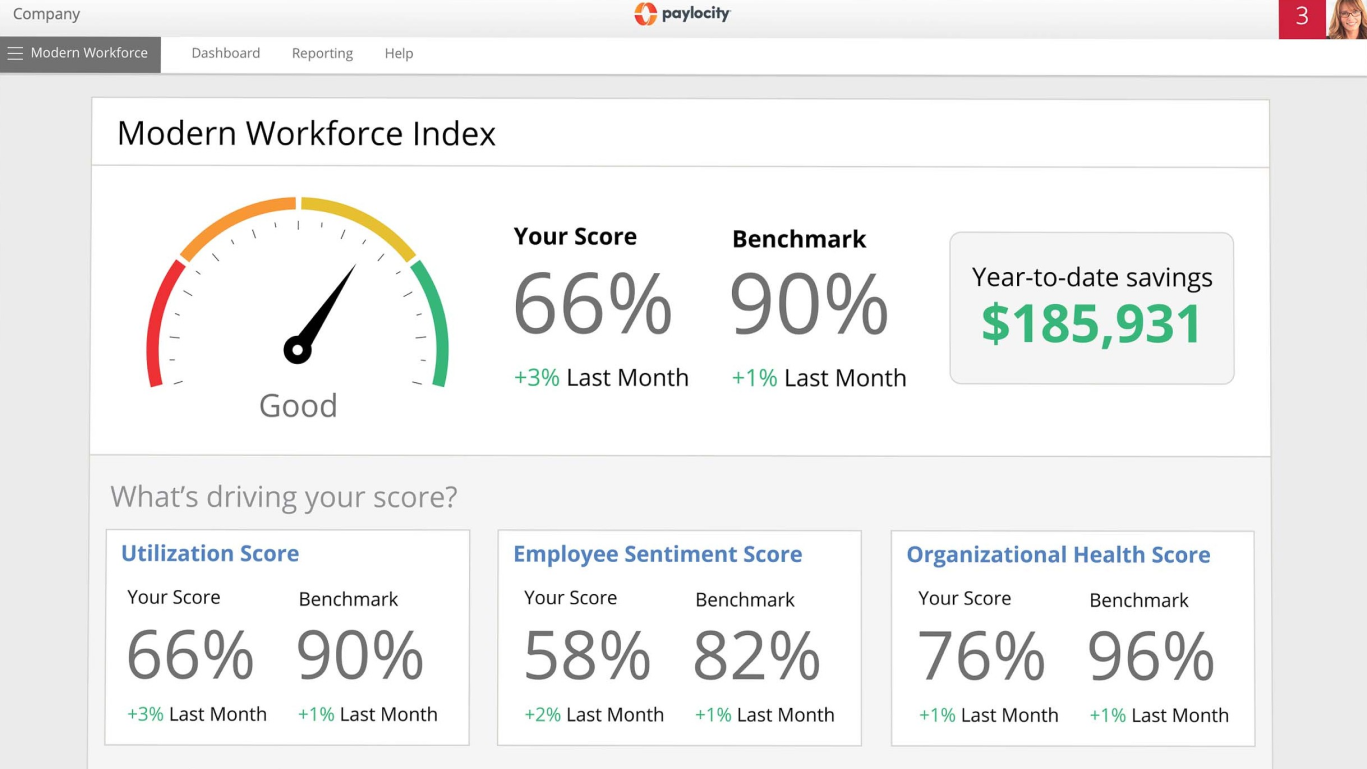
Paylocity is a popular corporate LMS software for employee training and development. You’ll find a diverse content library with hundreds of ready-to-use courses, including a five-part Diversity, Equity, Inclusion, and Accessibility (DEI) program and a Safety Training Bundle.
Administrators can easily assign courses to individuals or groups, set due dates, and monitor completions with tracking capabilities. The platform supports various learning formats, including video-based training and self-generated content.
Integration with Paylocity’s Community hub fosters peer-to-peer knowledge sharing. In my opinion, it’s suitable for organizations aiming to promote a culture of continuous learning.
Features:
- Bulk assignments track completions for online and in-person sessions
- Progress tracking monitors completion rates and individual achievements
- Employee-generated content supports knowledge sharing through videos
- Course recommendations provide targeted learning paths for employees
- Supervisor sign-offs confirm learning outcomes for assigned courses
Pros:
- Tailored training materials combine built-in and custom course content
- Mobile access supports on-the-go learning for flexible training options
- Community hub distributes training content to enhance engagement
Cons:
- Some users find the dashboard confusing, especially those who are not technologically adept
- Users reported bulk assignment features lack advanced filters, making it time-consuming to assign courses to dynamic groups
Pricing:
Pricing depends on chosen product modules, number of employees, and service level. Extra services, like advanced analytics, can raise total costs.
User Ratings:
5. Litmos
Best for Off-the-Shelf Training
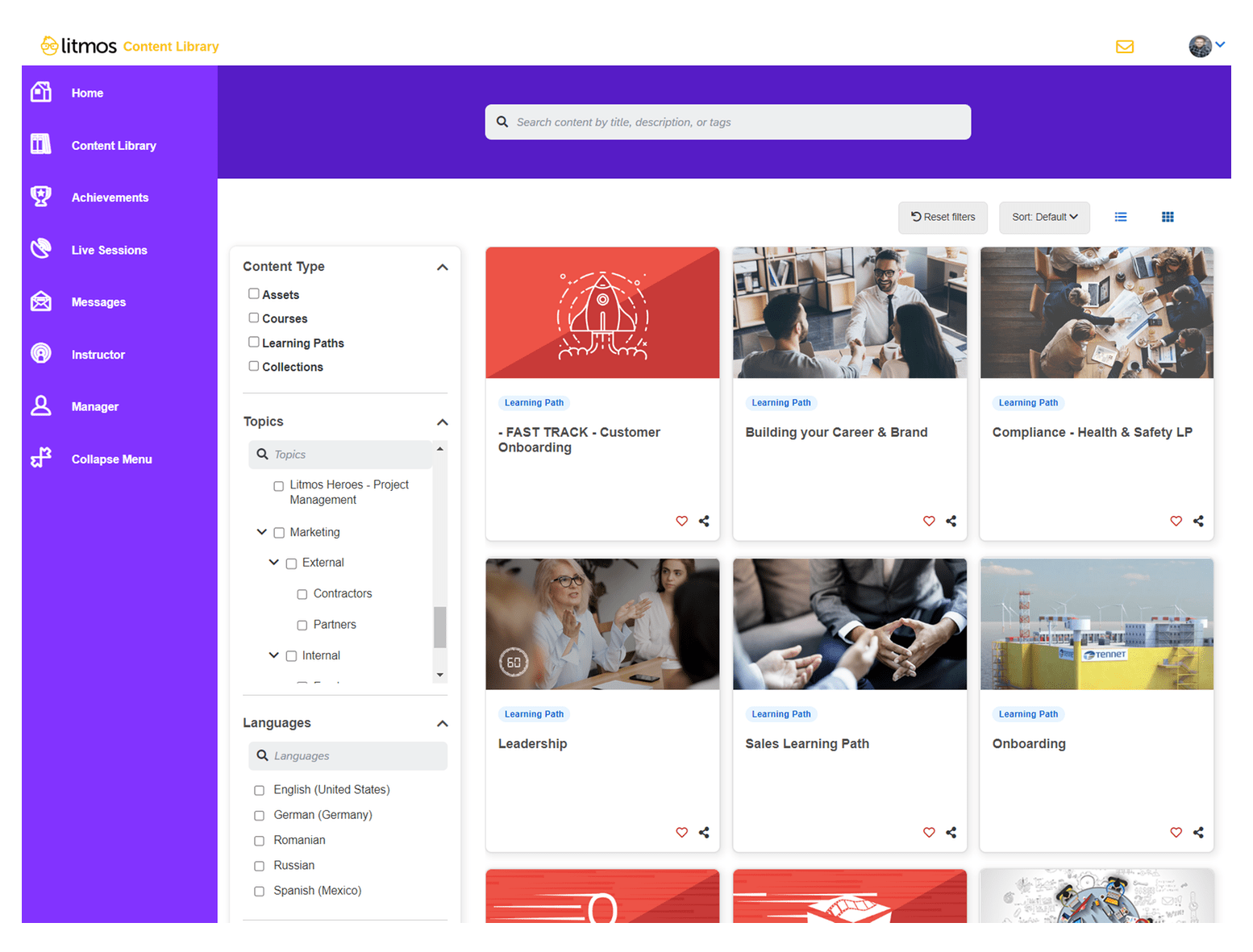
Litmos is one of the best corporate LMS systems if you’re looking for a ready-to-go LMS with a library of pre-built courses. They have a wide range of off-the-shelf compliance, leadership, and sales training content.
However, the software is more than just off-the-shelf content. It also gives you the tools to create and customize your courses. So, if you want to add your branding or tailor the content to your specific needs, you can do that.
Plus, Litmos has a mobile app that allows your employees to access training on the go. This is a great feature for companies with remote workers.
Features:
- Customizable reports to track course completions and quiz performance
- Virtual instructor-led training for automation of attendance tracking
- Gamified learning uses badges, leaderboards, and certificates
- Video assessments use AI to review learner submissions
- Personalized playlists to explore tailored training options
Pros:
- AI-powered recommendations suggest courses tailored to learner preferences
- Mobile learning ensures access to training both online and offline
- Manager dashboards provide insights and nudge non-compliant employees
Cons:
- Some users have found the course-building process in Litmos to have a steep learning curve
- Managing re-registration for the same course on different dates requires unnecessary manual intervention
Pricing:
Pricing depends on features, user count, and support. Advanced options or integrations can raise total costs.
User Ratings:
6. Rippling
Best for Automated Compliance & Training
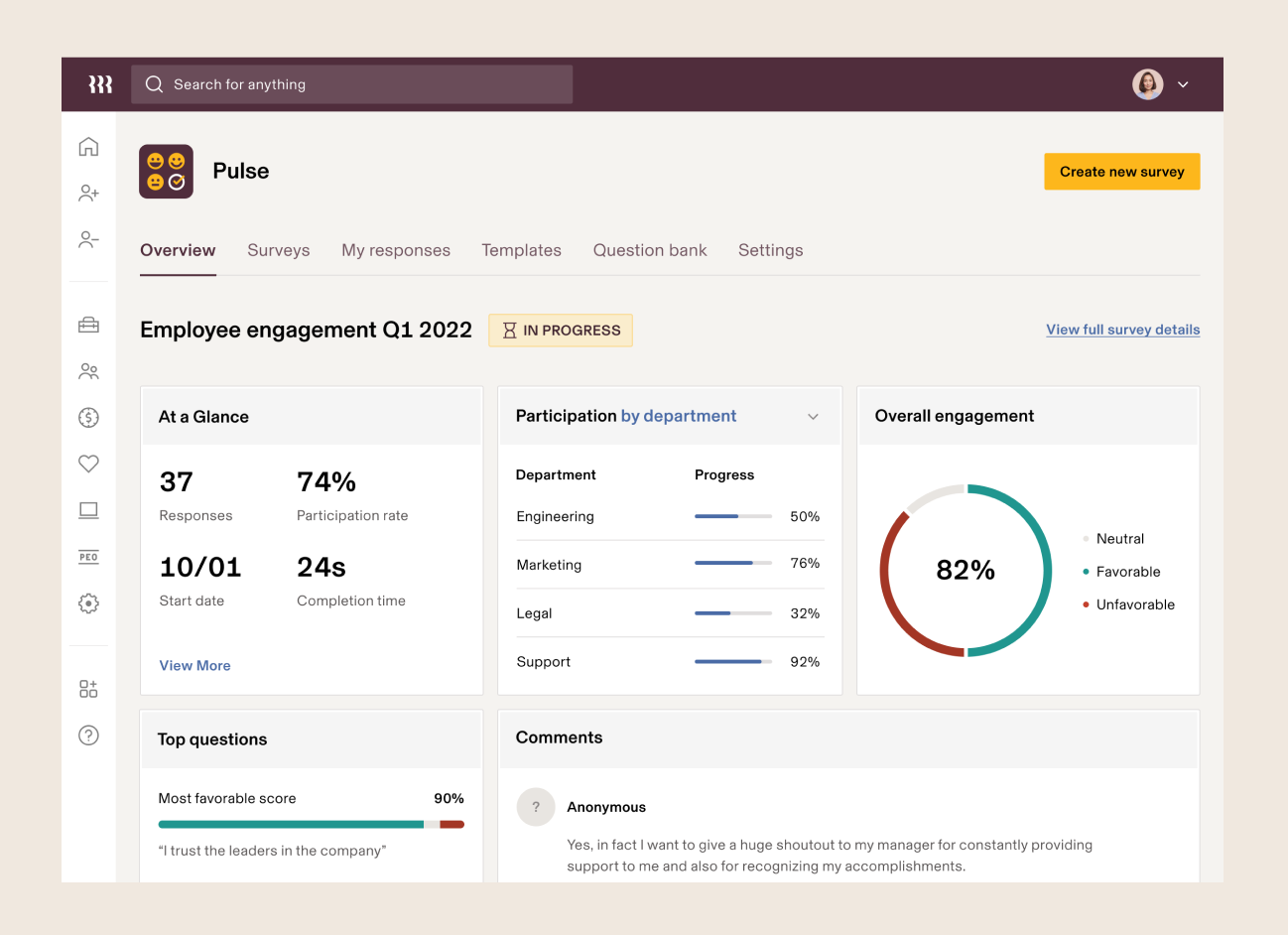
Rippling is an interesting one because it’s not just an LMS. It’s actually a complete HR platform with a built-in LMS. This means you can manage everything from payroll and benefits to employee training.
Now, when it comes to the LMS part, the software excels at automating compliance training.
You can easily assign courses, track completion, and generate reports to ensure everyone stays up-to-date on the latest regulations. It removes the headache of managing compliance, which is a huge plus for any HR department.
Plus, Rippling’s automation features extend beyond compliance. You can automate various training tasks, like enrollment and reminders, freeing up time for more strategic initiatives.
Features:
- Automated course assignments triggered by employee events like onboarding
- Integration with Go1 for access to an extensive range of additional courses
- Automated reminders via email or push notifications for timely course completion
- Built-in questionnaires and assessments to evaluate employee engagement
- Detailed reporting on training progress, including enrollments and completion rates
Pros:
- Pre-built course library with compliance topics like workplace safety and anti-harassment
- Support for uploading custom SCORM packages
- Mobile-friendly courses accessible on various devices
Cons:
- Some users feel the reporting features may not be as suitable as those in specialized training platforms
- While Go1 integration provides course variety, relying on external providers could lead to limitations in customization or course updates
Pricing:
Pricing depends on chosen modules, employee count, and support level. Additional modules or advanced features increase total costs.
User Ratings:
7. iSpring Learn
Best for eLearning & Training
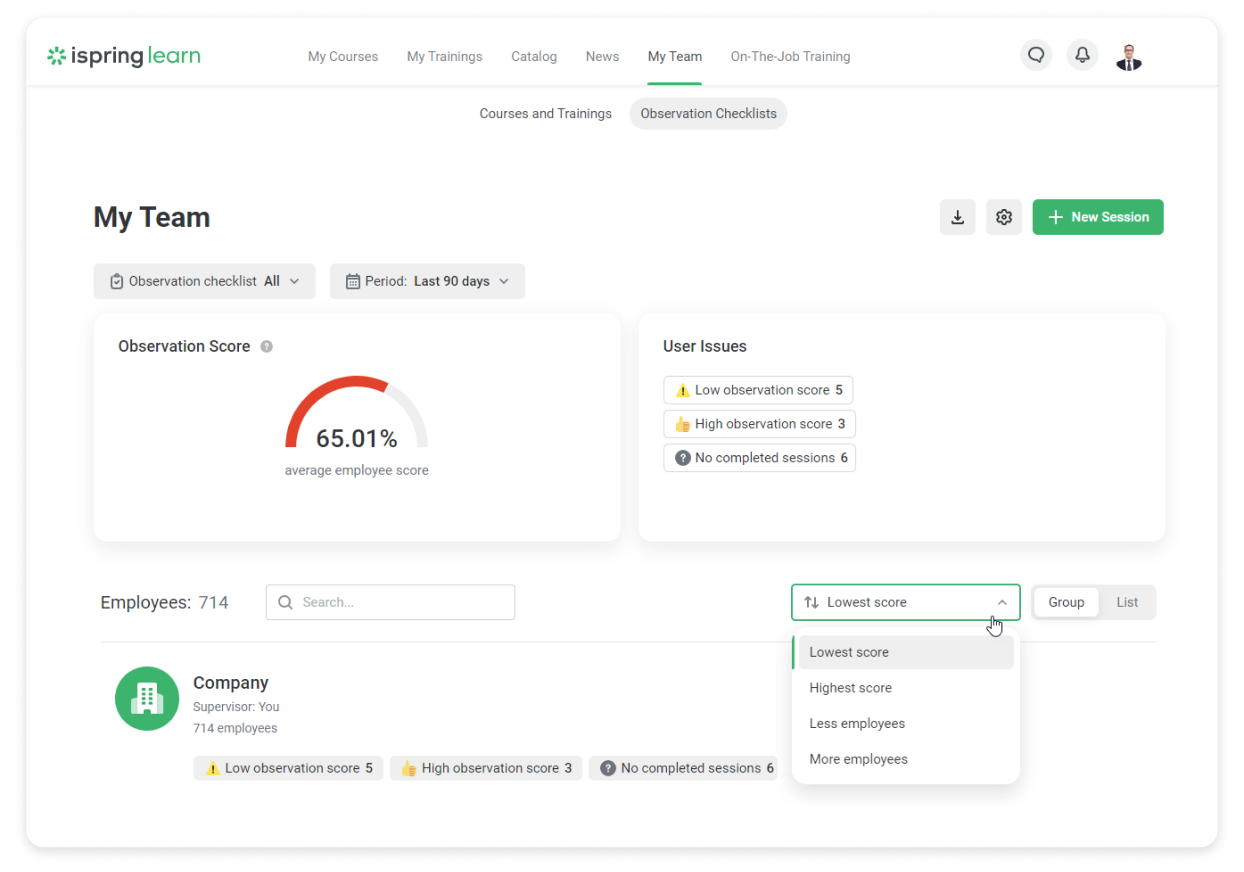
iSpring Learn helps you deploy eLearning programs quickly. They have this awesome tool called iSpring Suite that lets you build interactive courses, quizzes, and even engaging video lectures everyone loves.
But it’s not just about creating cool content; the software also helps you keep track of how your learners are doing. You can see who’s completed courses, how they scored on quizzes, and even spot those areas where they might need a little extra help.
I also like its ability to integrate real-time webinars using Zoom. This allows for live training sessions alongside self-paced modules.
Features:
- SCORM compatibility for seamless tracking of course completion data
- Interactive long-reads combine text, images, and media for engaging training
- Sequential navigation organizes learning into guided, step-by-step chapters
- Embedded self-tests to evaluate understanding and boost knowledge retention
- Integrated authoring tools to create quizzes and simulations
Pros:
- Multimedia content supports presentations, SCORM files, and interactive videos
- Mobile compatibility provides access to training on any connected device
- Unlimited storage allows hosting extensive training materials without limits
Cons:
- Users have reported challenges in creating custom reports, often due to system bugs
- The platform’s full potential is often realized only when used in conjunction with iSpring Suite, which requires additional investment
Pricing:
Starts at $6.70/user/month.
User Ratings:
8. Edmingle
Best for Training Sales Team
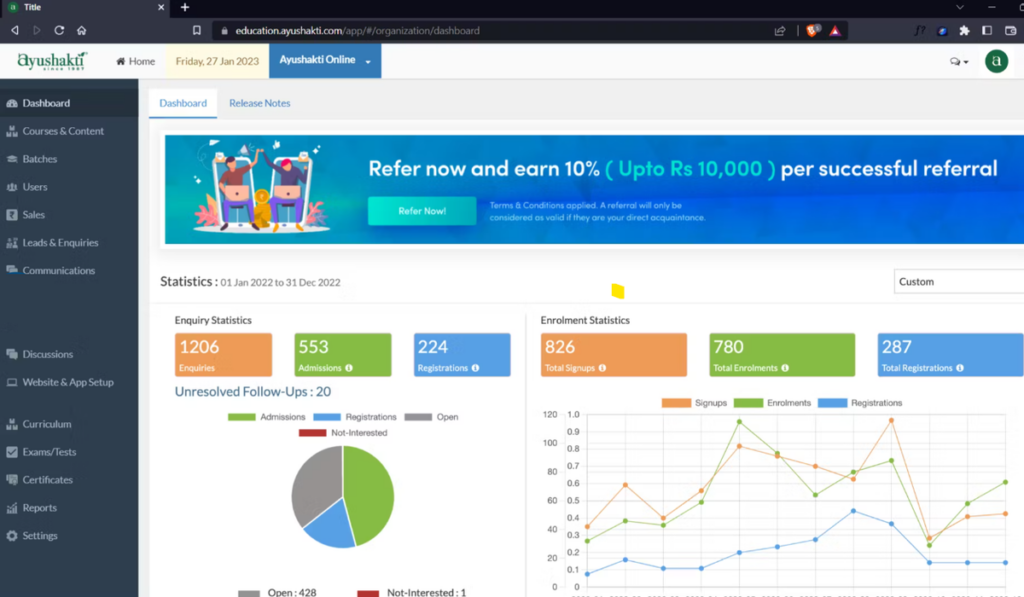
Edmingle offers a unified cloud-based LMS platform enhanced with AI-powered analytics & reporting. It helps training businesses & educators create, manage, deliver, and scale impactful training programs and online courses. Focusing on learner engagement & satisfaction, it offers a 100% white-labeled website, landing pages, and mobile apps (both Android & iOS). With 24×7 access to an exceptional support team, it’s the one-stop platform for all your training needs.
Features:
- AI-powered analytics on learners, courses & assessments
- Comprehensive reporting via interactive dashboards
- Engagement funnels to retarget learners
- SCORM support with security features like DRM & watermarking
- Live class support with Deep Zoom integration
- Automated attendance tracking & class recording
Pros:
- Easy to scale for a growing number of learners & courses
- Facilitates remote training with it’s cloud-based nature & mobile compatibility
- Multi-tenant platform for seamless management of multiple batches & branches
- Easy to implement & adopt with go-to-market of less than a week
Cons:
- Some users find the onboarding process for students a bit confusing
Pricing:
- Starts at $109/month
User Ratings:
9. Seismic Learning
Best for Training Sales Team
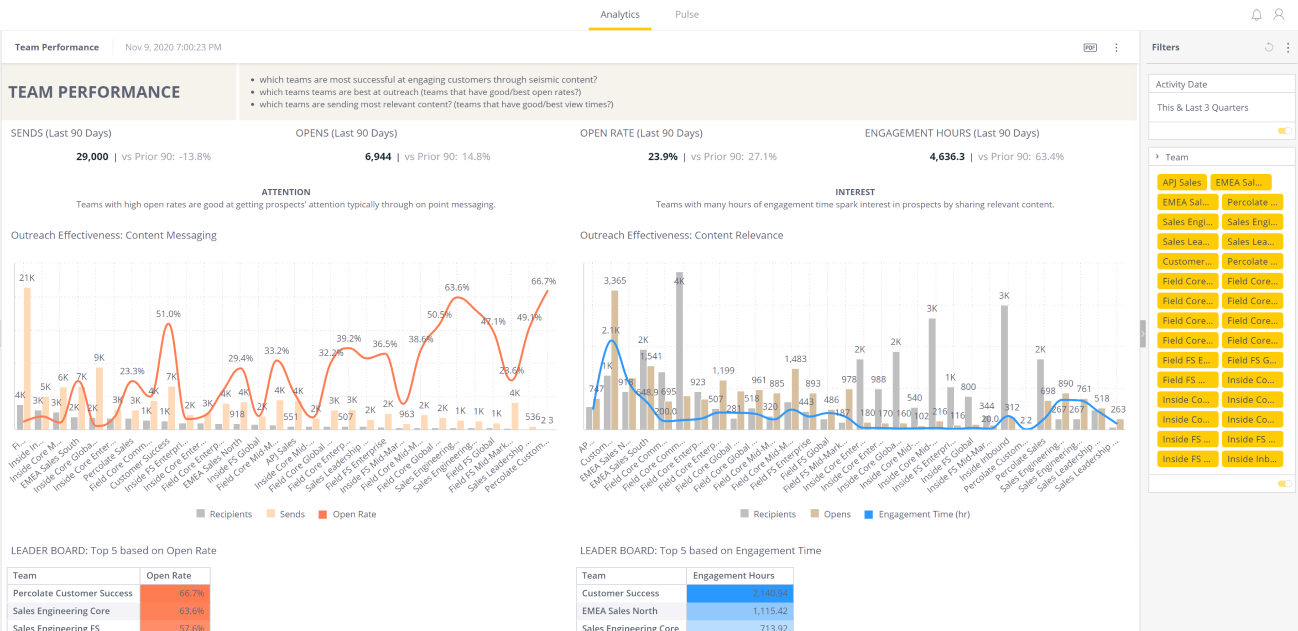
Seismic Learning (formerly Lessonly) is purpose-built for sales enablement. It’s not just another LMS; it’s a complete platform for equipping your sales team with the tools they need to be successful.
The platform uses AI to personalize the learning experience for each sales rep. It includes customizable learning paths and real-world practice scenarios.
So, let’s say you have a new sales hire. The software can automatically recommend relevant training materials based on their role, experience level, and even the deals they’re working on. This ensures they get the information they need exactly when they need it.
Plus, Seismic integrates with other sales tools like Salesforce and Microsoft Dynamics, which can be a huge plus for sales operations.
Features:
- Interactive knowledge checks to reinforce learning and verify understanding
- Blended learning combines various methods to fit learner needs
- Live training sessions for engagement and immediate feedback
- Coaching tools for personalized feedback to improve individual skills
- Training impact analytics to measure results like win rates and quotas
Pros:
- Accelerated onboarding programs to quickly enhance sales-readiness
- Scalable learning paths adapt to diverse styles and employee needs
- Comprehensive lesson paths ensure learning objectives align with goals
Cons:
- Some users have noted that the platform may lack certain engaging content features, such as advanced quizzes
- Some users reported updating training content sometimes leads to version control issues, which may confuse learners
Pricing:
Custom pricing based on user count, features, and deployment needs. Costs vary with the level of customization, integrations, and support services required.
User Ratings:
10. Tovuti – Best for Corporate Learning & Development
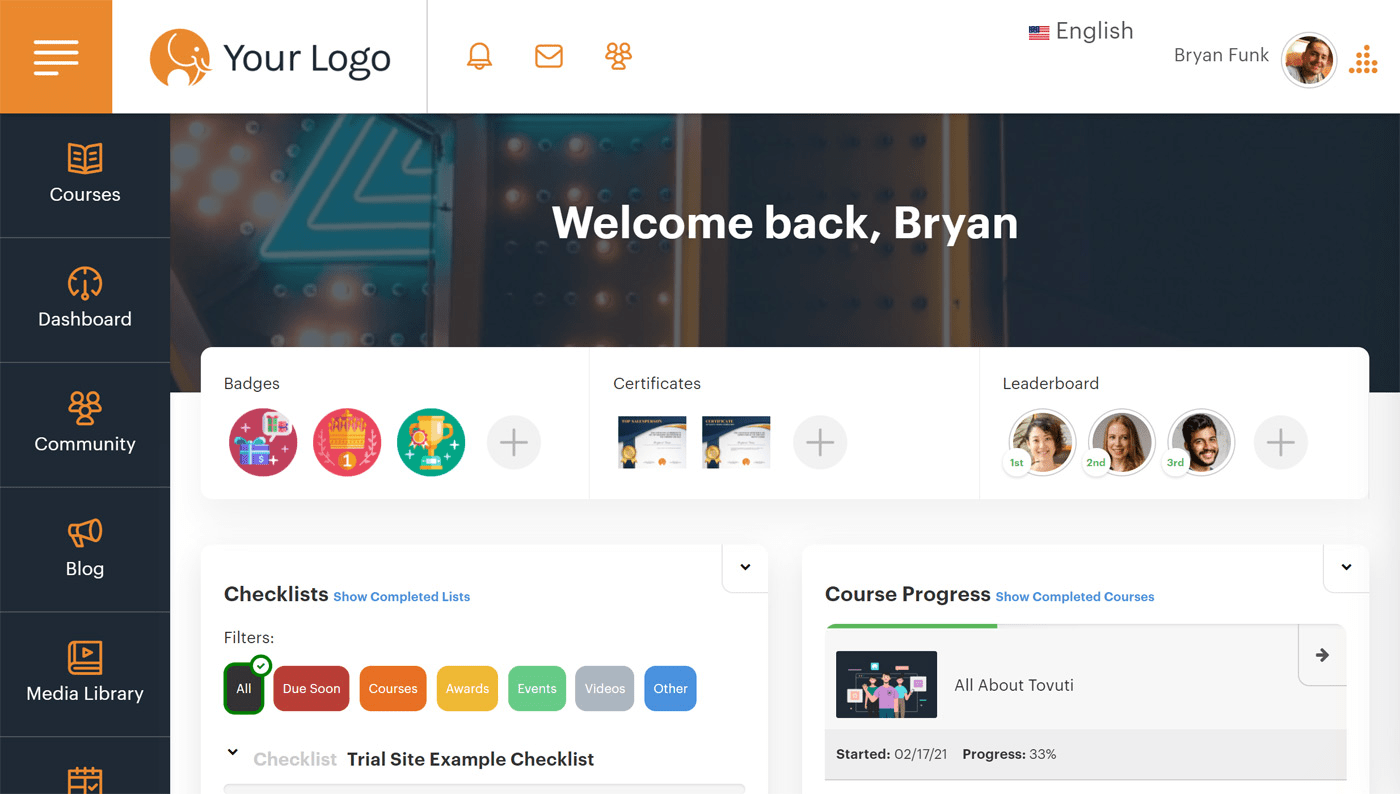
Tovuti is a strong contender in the corporate learning space. It’s got a good mix of features that support both employee development and overall organizational growth.
One thing that sets the software apart is its focus on social learning and community building. I like the built-in tools, such as discussion forums, peer-to-peer assessments, and virtual classrooms, that encourage collaboration and knowledge sharing among employees.
Now, imagine you want to create a mentoring program where experienced employees can share their knowledge with newer team members. The platform makes this easy.
You can create dedicated spaces for mentors and mentees to connect, share resources, and track progress. This type of social learning can be really valuable for fostering a culture of continuous improvement.
Features:
- SCORM file support for importing existing training materials
- Lesson gating for task completion before advancing to the next step
- Quizzes with varied question types to evaluate learner understanding
- Learning paths to assign courses based on milestone progress
- Gamified elements include badges, leaderboards, and engaging activities
Pros:
- User groups to organize learners for permissions, courses, and reporting needs
- Virtual classrooms for live training sessions with real-time engagement
- Event management handles registrations, reminders, and waitlists for events
Cons:
- A few reviewers have mentioned that the backend of the tool is complex and not user-friendly
- Some users find white-labeling options to be limited, which may hamper personalization needs
Pricing:
Subscription-based pricing that scales with the number of learners and chosen features. Add-ons—like eCommerce, custom branding, or advanced analytics—can increase total costs.
User Ratings:
11. 360Learning
Best for Collaborative Learning
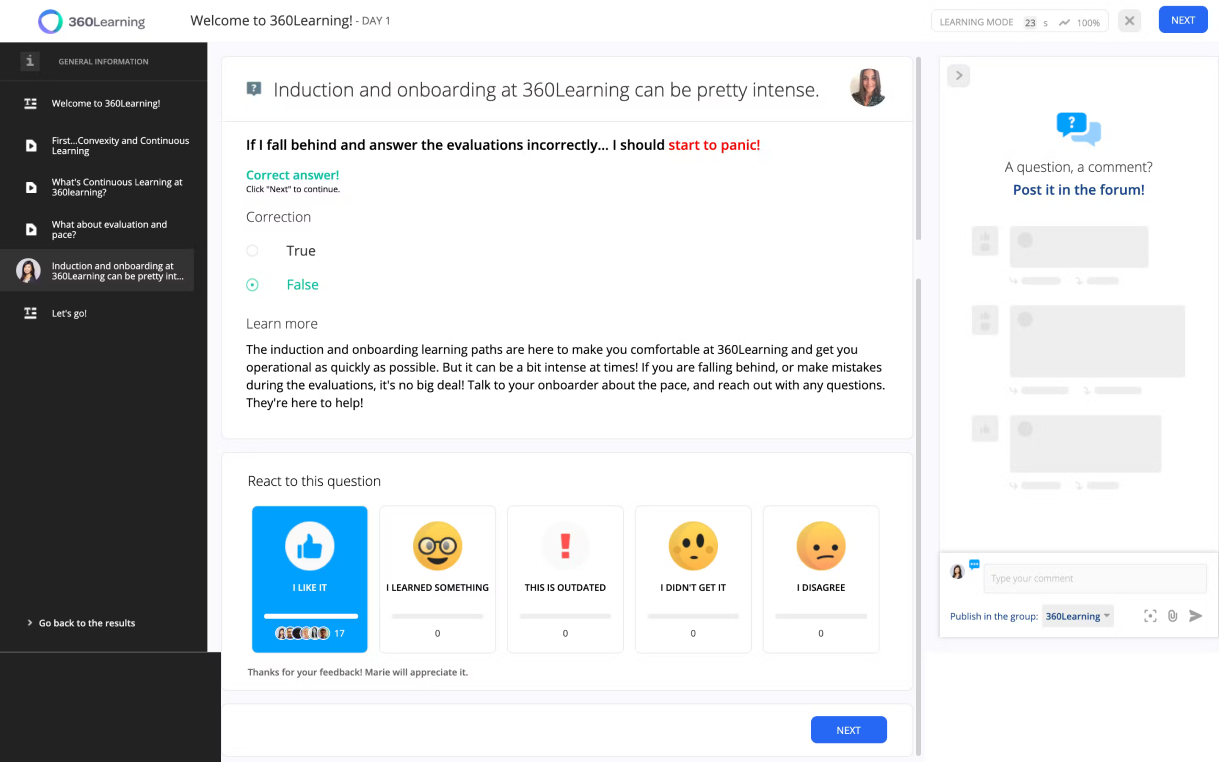
360Learning takes a unique approach to corporate training. It’s built on the idea that learning should be a collaborative and social experience.
Instead of relying solely on top-down training from instructors, it empowers your employees to create and share their own learning content. I’ll explain briefly.
Let’s say a sales rep discovers a new closing technique. They can create a quick tutorial and share it with their colleagues using the software.
This kind of peer-to-peer learning can be incredibly valuable. It taps into the collective knowledge of your workforce and promotes continuous learning.
Features:
- SCORM file support for importing existing training materials
- Lesson gating for task completion before advancing to the next step
- Quizzes with varied question types to evaluate learner understanding
- Learning paths to assign courses based on milestone progress
- Gamified elements include badges, leaderboards, and engaging activities
Pros:
- User groups to organize learners for permissions, courses, and reporting needs
- Virtual classrooms for live training sessions with real-time engagement
- Event management handles registrations, reminders, and waitlists for events
Cons:
- Some users have noted that there is a learning curve associated with the platform
- The administrative side of 360Learning can involve extra steps that seem unnecessary and slow down admin users
Pricing:
Starts at $8/user/month (up to 100 learners).
User Ratings:
Corporate Learning Management System Buyers’ Guide
Now that you know your options, why not acquire more in-depth knowledge to make a sound decision when selecting the best from the corporate LMS platforms?
I did some research and shared some of the most important things you should know about. Without further ado, let’s get started.
Choosing the right LMS for corporate training requires a careful assessment of your training needs, goals, and resources.
Here’s a simple step-by-step guide –
1. The “Why” Behind the LMS
Are you looking to onboard employees faster, provide compliance training, or provide a platform for ongoing skill development? You need a clear goal to guide the entire selection process.
For instance, if compliance is your top priority, focus on features like certification tracking. It’s about knowing what problem you’re solving.
2. Look for Scalability
Your business will grow, and so will your training requirements. A scalable LMS can accommodate more users, advanced features, and additional content as your organization expands.
For example, if you check ProProfs Training Maker, you’ll find plans for small- to medium-sized businesses and large enterprises.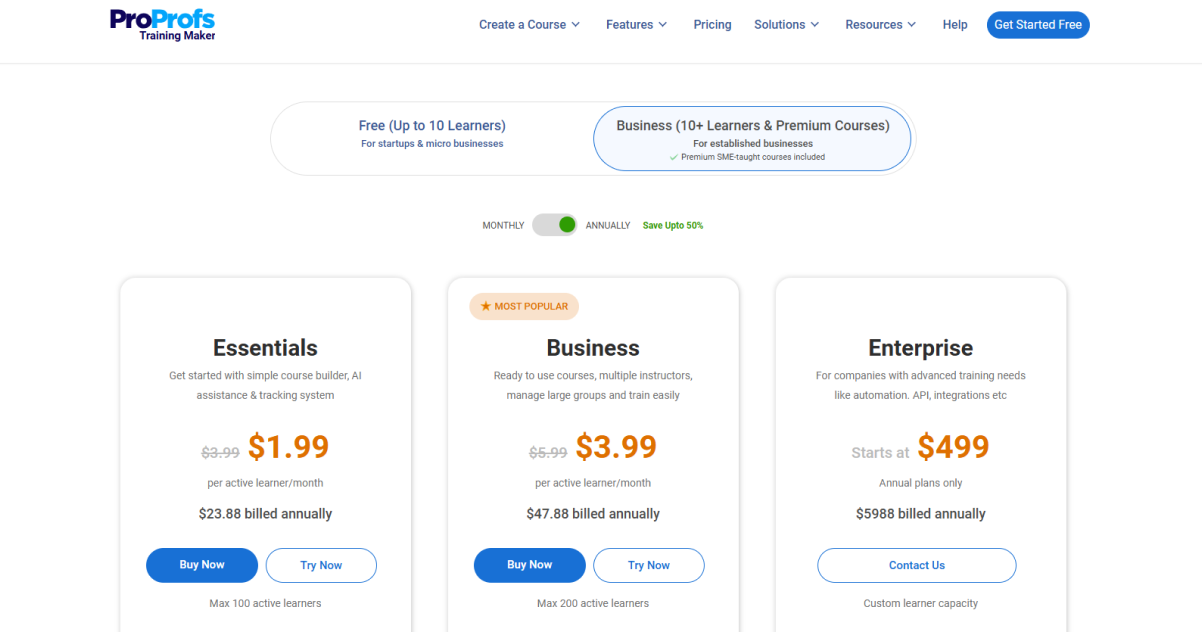
Investing in a platform like this will save you the hassle of shifting to a new tool tomorrow as your business grows.
3. Test the System’s Usability With Real Scenarios
An LMS can be feature-rich, but it won’t deliver results if it’s not intuitive.
Well, that means testing it from both admin and learner perspectives before committing. The best way to do that is to sign up for your free plan or trial, whatever your software vendor offers.
Next, create a mock course, enroll users, and analyze how easily they navigate the platform. If setting up a simple course feels like solving a puzzle, it’s a red flag.
4. Does It Work Well With Your Other Tools?
An LMS that doesn’t sync with your HR software or requires manual data entry feels like a nightmare, right?
Your LMS should integrate seamlessly with your existing systems, like CRMs, HR platforms, or communication tools. This not only saves time but also ensures your workflow isn’t disrupted.
5. Mobile Accessibility Is a Must
With remote and hybrid work on the rise, your LMS must be mobile-friendly. Employees should be able to learn on their devices, whether they’re commuting or working from home. If the system isn’t optimized for smartphones and tablets, it might limit learner engagement.
6. Check the Support Options
Even the best corporate LMS software can hit snags. When it does, you’ll need support.
So, does your software vendor offer 24/7 assistance? Are there training resources for admins and employees?
You must explore the level of support provided—because downtime or unanswered questions can derail your training goals. Ask the software vendor about support options or check for user feedback on software review sites and social media platforms.
These are key factors you should keep in mind when selecting corporate learning management systems. You can also watch this quick video to have a visual understanding –
What Are the Top Features to Look for in a Corporate LMS?
I’ve spent years working with different corporate learning management systems, and here are some of the features I find the most useful –
- Course Builder: Check if the software lets you create and deploy high-quality training materials using a course builder. For example, ProProfs Training Maker enables you to design engaging training courses in minutes using AI.
- Templates & Pre-Built Courses: Look for templates or a repository of professionally designed and customizable online training courses on various industry-specific topics. This helps you get started even with little to no prior experience.
- Quizzes & Surveys: Any corporate learning platform should offer quizzes and assessment tools to see if employees understand their training properly.
- Learning Paths: You should be able to create structured learning paths with sequential modules and courses.
- Collaboration Tools: Any corporate learning management software should include discussion forums, roles and permissions, online classrooms, and other features like sharing resources.
- Gamification: Check whether the software lets you add points, badges, and leaderboards to enhance training engagement.
- White-Labeling: Any LMS platform should let you customize courses with your own branding elements, such as logos, themes, messages, certificates, badges, etc., to maintain brand consistency.
- Single Sign-On (SSO): It enables automatic user authentication for seamless access to the LMS platform.
- Course Scheduling: This one is helpful for businesses with remote teams. You can set specific times for courses or chapters to become available to learners based on time zones.
- Reporting & Analytics: This is a must-have feature to track learner progress, performance, and engagement.
While these are some of the most sought-after features, there are plenty more. If you want a more defined idea of what features to expect, explore our comprehensive guide to LMS features tailored to your needs.
How Can a Corporate LMS Help You?
I keep saying this often that only after you use an LMS for corporate training,you realize what you were missing. It’s not a magic bullet that will solve all your recruiting and onboarding woes, but it will definitely simplify the process. How?
Well, here are a few ways how a corporate LMS can help:
1. Simplifies Employee Onboarding
You can ensure that every new hire gets the same high-quality training experience. The LMS software centralizes onboarding materials such as company policies, workflows, and job-specific resources.
2. Encourages Continuous Learning
Whether it’s upskilling your team or providing ongoing professional development, an LMS gives employees access to training materials anytime, anywhere. This flexibility motivates self-paced learning and fosters a culture of growth.
Notably, a 2022 survey by SHRM found that around 70% of employees prefer online, self-paced courses.
3. Tracks Progress & Performance
Most LMS software for corporates comes with built-in analytics to monitor learning outcomes. You can track who’s completed training, how well they performed, and identify gaps in knowledge. This data-driven insight helps refine training programs for better future results.
4. Ensures Compliance
An LMS helps you consistently deliver compliance training in industries with strict regulations (healthcare, construction, manufacturing, etc.). Automated reminders and certification tracking ensure your team stays updated with industry standards and requirements.
5. Saves Time & Costs
An LMS eliminates the need for repeated in-person training sessions. By digitizing and automating the process, you reduce administrative effort and cut down on training expenses like travel, venues, and printed materials.
6. Customizes Training
Every team and role is unique. A corporate learning management platform lets you tailor learning paths based on employee roles, skills, or goals. Personalized learning ensures the training feels relevant and impactful for every individual.
7. Boosts Productivity & Engagement
Well-trained employees are more confident and capable in their roles, eventually leading to higher productivity. Engaging learning formats like videos, gamification, and quizzes motivate your employees to complete their training.
8. Supports Remote & Hybrid Work
In today’s remote-first world, an LMS provides an accessible platform where employees can learn at their convenience. Cloud-based LMS systems allow for seamless learning experiences, no matter where your team is located.
Plus, collaborating with team members is also easy via video conferencing, multilingual support, automated reminders, etc.
Corporate Training Wins: LMS Case Studies
Now that we are almost at the end of the blog let’s check some real-life examples of how corporate LMS platforms have contributed to the success of businesses.
Here are some of the winning case studies that I found the most relevant –
1. Tupperware Brands: Simplifying Safety Training Across Borders
Tupperware, a global leader in household products, faced a significant challenge: how to provide consistent safety training to operators across multiple European plants.
The training was crucial for maintaining operational safety and compliance with ISO certification standards, yet managing it manually was prone to errors. They decided to use ProProfs Training Maker.
Using ProProfs, Tupperware created accessible online courses and assessments tailored to their safety requirements. The results were transformative. Not only did the company achieve consistent safety compliance across all locations, but it also streamlined the ISO certification process.
Looking for the full success story? Click here or watch this video below –
2. Thermo Fisher Scientific: Revolutionizing Global Assessments
When a multinational giant like Thermo Fisher Scientific needed to administer exams to a vast, globally dispersed workforce, the traditional methods weren’t cutting it.
Scheduling and executing tests for hundreds of employees across different time zones was a logistical nightmare. That’s when ProProfs Training Maker became their game-changer.
Using the LMS, Thermo Fisher transitioned to an online exam format that was both scalable and efficient.
The company could automate the process and deliver exams to employees worldwide. Beyond convenience, ProProfs offered detailed analytics, helping Thermo Fisher refine their questions and assess employee performance with unprecedented accuracy.
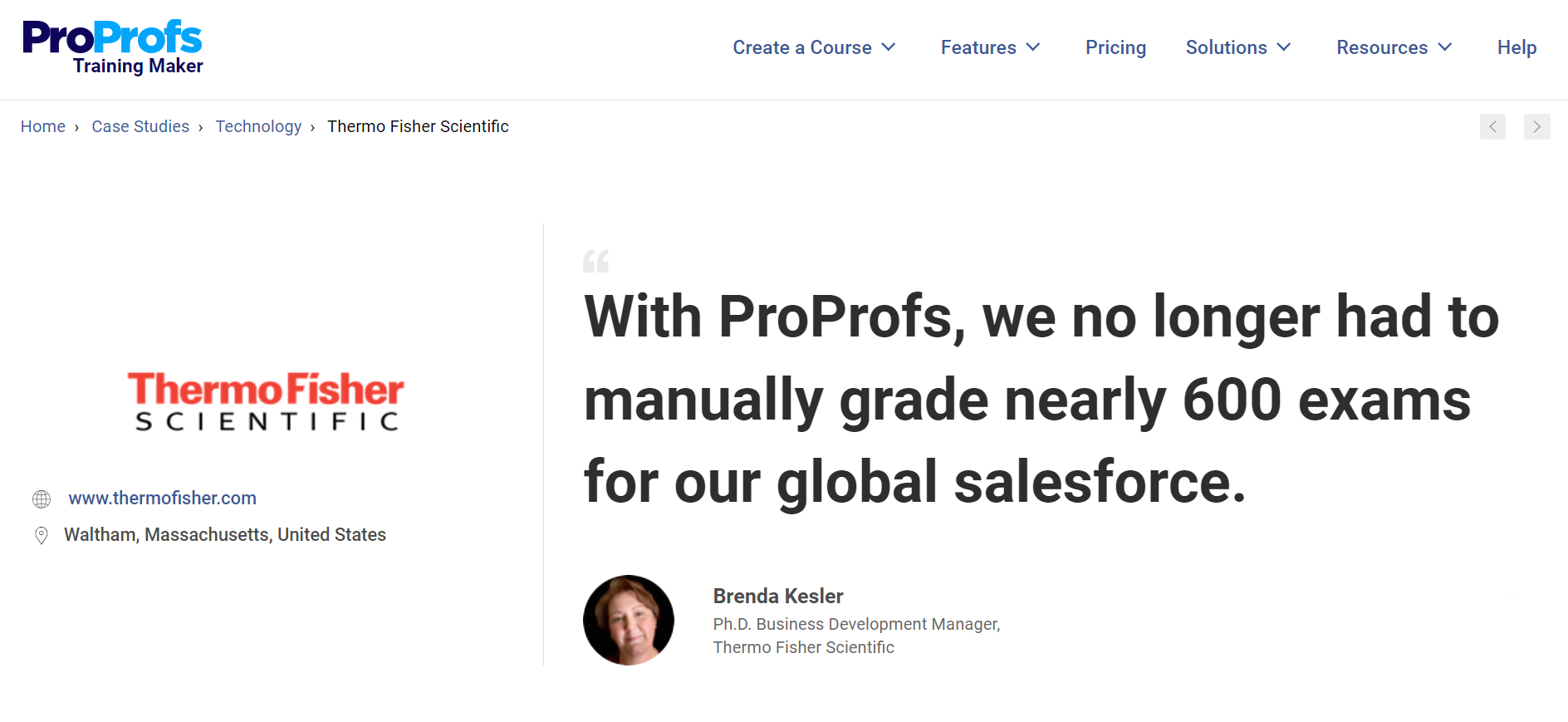
Get Free LMS Software — All Features, Forever.
We've helped 567 companies train 200,000+ employees. Create courses in under a minute with our AI LMS or use 200+ ready-made courses on compliance, harassment, DEI, onboarding, and more!
Power up Your Training Sessions With a Corporate LMS
Investing in the best corporate LMS software isn’t just about managing training but about transforming how your employees learn and grow. The right LMS aligns with your business goals, simplifies employee development, and ensures your workforce stays skilled and engaged.
From platforms that personalize learning paths to systems that simplify complex workflows, the options are abundant.
The key lies in understanding your unique requirements and choosing a solution that saves time and effort while empowering your team to achieve faster.
So, what’s the best way to get started? It’s simple.
Try out a few demos or simply get started for free (some tools do offer forever-free plans). That should help you get a first-hand experience of how the tool fares in day-to-day life.
In the end, it’s all about how much you’re willing to go to find the best corporate learning management systems on the market. Good luck!
Learn More About the Best Corporate LMS Software
What is the ROI of using a corporate LMS?
The ROI of using a corporate LMS lies in reduced training costs, improved employee performance, and time savings. It eliminates expenses associated with in-person training, such as travel and materials, and automates administrative tasks like course assignments and tracking.
Employees upskill faster, leading to higher productivity and better job performance. With detailed analytics, you can identify training gaps. For businesses, this translates into increased efficiency, compliance, and long-term cost savings.
Can I integrate an LMS with existing tools?
Yes, most modern LMS platforms support integration with third-party tools like HR systems, CRMs, and productivity software. For example, ProProfs Training Maker can be integrated with popular tools such as MailChimp, Salesforce, Zoom, SugarCRM, etc.
How secure is an LMS?
The security of an LMS is paramount, as it safeguards sensitive data and ensures compliance with industry standards. Any reliable LMS software vendor should have measures like data encryption, secure user authentication, regular security updates, and compliance with regulations such as GDPR.
For example, ProProfs Training Maker utilizes SSL encryption to protect data during transmission and offers password protection for courses to control access. The platform also conducts regular vulnerability assessments to identify potential threats. Additionally, ProProfs is GDPR-compliant, ensuring the privacy and security of user data.
How do I implement a corporate learning management system?
Implementing a corporate learning management system is straightforward. Identify your training goals, such as onboarding new employees, providing compliance training, or developing skills.
Next, select an LMS platform that aligns with these goals, supports your team size, and integrates seamlessly with your existing tools. Once chosen, customize the platform with your branding, course materials, and user roles. Upload your training content, including videos, documents, quizzes, or pre-built courses.
Finally, launch your LMS, track progress using built-in analytics, and continually gather feedback to refine the learning experience.
 Tips
Tips
We’d love to hear your tips & suggestions on this article!
Get Free LMS Software — All Features, Forever.
We've helped 567 companies train 200,000+ employees. Create courses in under a minute with our AI LMS or use 200+ ready-made courses on compliance, harassment, DEI, onboarding, and more!

 We'd love your feedback!
We'd love your feedback! Thanks for your feedback!
Thanks for your feedback!



